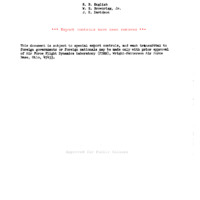-
Title
-
Design, Fabrication, Testing, And Data Analysis Of Adam II Concept (Propulsive Wing). Part IV. Testing In The Langley Research Center 16-Foot Transonic Wind Tunnel
-
Date
-
1968
-
Index Abstract
-
Coming Soon
-
Photo Quality
-
Complete
-
Report Number
-
AFFDL TR 68-31 Part 4
-
Creator
-
English, Robert B.
-
Davidson, Jim K.
-
Brownrigg, William E., Jr.
-
Corporate Author
-
LTV Aerospace Corp Dallas Tx Vought Aeronautics Div
-
Laboratory
-
Air Force Flight Dynamics Laboratory
-
Extent
-
174
-
Identifier
-
AD0832606
-
Access Rights
-
Export Controls
-
Distribution Classification
-
1
-
Contract
-
AF 33(615)-3293
-
DoD Project
-
1366
-
DoD Task
-
136617
-
DTIC Record Exists
-
No
-
Distribution Change Authority Correspondence
-
AFFDL LTR
-
Distribution Conflict
-
No
-
Special Scanning Requirements
-
Lots of fold out pages
-
Abstract
-
An analysis of data obtained from a high speed wind tunnel test of a straight, low aspect ratio propulsive wing V/STOL aircraft concept is presented. Essential features of the model are four compressed-air tip driven fans in the wing with vectorable exhaust, fixed exhausts blowing over the top of a remotely controlled flap simulating hot gas turbine exhaust velocities, a forward-facing nose fan for pitch control with vectorable exhaust, horizontal tail surfaces mounted on booms extending aft as part of the wing tips, and a centerline vertical tail. The model was tested in the cruise mode, where the propulsive flows were deflected symmetrically by flap deflections ranging from 0 to 41 degrees. Stability, control, and a limited amount of pressure data were obtained for various momentum coefficients, Mach numbers, and configuration changes. Results in terms of drag-rise Mach number and flying qualities are generally satisfactory. The small capture-area wing inlets tested with the fan nose configuration indicated an improvement in drag and stability over the large capture-area inlets. Because of the proximity of the horizontal tails to the wing tip vortex, the horizontal tail contribution to longitudinal stability is increased due to favorable upwash. The centerline vertical tail provides an improvement to directional stability over the outboard vertical tails. While these Langley wind tunnel test results have contributed data and insight to the ADAM II propulsive wing concept, certain aspects of the data indicate the need for additional wind tunnel testing.
-
Report Availability
-
Full text available
-
Date Issued
-
1968-05
-
Provenance
-
Lockheed Martin Missiles & Fire Control
-
Type
-
report
-
Format
-
1 online resource
 AFFDLTR68-031part04.pdf
AFFDLTR68-031part04.pdf